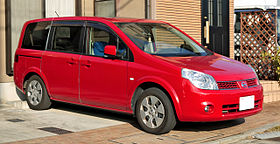Nissan Lafesta
| Nissan Lafesta | |
|---|---|
 | |
| Overview | |
| Manufacturer | Nissan |
| Production | September 2004 – December 2017 |
| Body and chassis | |
| Class | Compact MPV |
| Body style | 5-door minivan |
| Layout | |
| Chronology | |
| Predecessor | Nissan Prairie |
| Successor | Nissan Serena (C27) Nissan NV200 |
The Nissan Lafesta (Japanese:
Etymology
[edit]The name was derived from the Italian word "festa", meaning holiday, festival or party, and according to the manufacturer "expresses a desire to spend an enjoyable time in the car together with family members or friends."
First generation (B30; 2004)
[edit]| First generation (B30/NB30) | |
|---|---|
 Nissan Lafesta (pre-facelift) | |
| Overview | |
| Production | September 2004–November 2012 |
| Assembly | Japan: Kanda, Fukuoka |
| Designer | Tetsuo Oosawa[1] |
| Body and chassis | |
| Platform | Nissan C platform |
| Related | |
| Powertrain | |
| Engine | 2.0 L MR20DE I4 |
| Transmission | CVT |
| Dimensions | |
| Wheelbase | 2,700 mm (110 in) |
| Length | 4,575 mm (180.1 in) |
| Width | 1,695 mm (66.7 in) |
| Height | 1,670 mm (66 in) |
| Curb weight | 1,520 kg (3,350 lb) |
It was unveiled on September 2, 2004 and first released on December 2, 2004, with a sales target of 5,000/month.[2] The Lafesta shares a platform with the Renault Scénic and Renault Megane.
The Lafesta was the successor to the Nissan Prairie/Liberty and competed with the Toyota Isis, Honda Stream, Toyota WISH, Subaru Exiga, and the Mazda Premacy. The Lafesta also replaced the Nissan Avenir.
The vehicle offers sliding doors on both sides (one of which is power-assisted), Nissan's Intelligent key system, GPS navigation system, reverse camera and a very large sunroof. The only engine option available is a 2.0 L MR20DE inline-four unit. Both front- and four-wheel drive transmissions are available; the former uses a torsion beam suspension at the rear while the latter has a trailing arm multi-link arrangement.
The Lafesta is built at the same factory that once produced the larger Nissan Presage.
In 2007, the Lafesta received a minor facelift.
The first generation Lafesta was discontinued in Japan on December 26, 2012, after being sold alongside the second generation, with it being rebranded as the Lafesta Joy. [citation needed]
-
Nissan Lafesta (pre-facelift)
-
Nissan Lafesta Highway Star (pre-facelift)
-
Nissan Lafesta (facelift)
-
Nissan Lafesta (facelift)
-
Nissan Lafesta Highway Star (facelift)
-
Interior
Second generation (B35; 2011)
[edit]| Second generation (CWEFWN/CWEAWN) | |
|---|---|
 | |
| Overview | |
| Also called | Mazda Premacy/Mazda5 |
| Production | May 2011–December 2017 |
| Assembly | Japan: Hiroshima (Mazda Hiroshima Plant) |
| Body and chassis | |
| Platform | Mazda CW platform |
| Powertrain | |
| Engine |
|
| Transmission |
|
| Dimensions | |
| Wheelbase | 2,750 mm (108 in) |
| Length | 4,615 mm (181.7 in) |
| Width | 1,750 mm (69 in) |
| Height | 1,615 mm (63.6 in) |

The second generation Lafesta is a version of the third generation Mazda Premacy supplied to Nissan by Mazda on an original equipment manufacturer (OEM) basis. Mazda supplied the Premacy for use in the Nissan Lafesta Highway Star beginning in May 2011.[3][4] Unlike the Premacy, the new Nissan Lafesta Highway Star ditches the Nagare design.
Japanese models went on sale on June 15, 2011.[5][6][7] Models available include Highway Star (J, G and G Supuremo).[8]
Discontinuation
[edit]Following the discontinuation of the Mazda Premacy, sales of the Nissan Lafesta Highway Star ended on March 24, 2018.[citation needed]
References
[edit]- ^ "Surface configuration of a vehicle body, toy, and/or replica".
- ^ "Nissan Press release: "Nissan Releases New Lafesta Minivan"". Archived from the original on 2013-10-21. Retrieved 2004-12-02.
- ^
日産 とマツダ、新 たなOEM供給 契約 を締結 - ^ Nissan and Mazda Agree on New OEM Contract
- ^ "Nissan Releases All-New Lafesta Highway STAR Minivan". Archived from the original on 2012-03-01. Retrieved 2014-03-28.
- ^ Nissan offers rebadged Mazda5 in Japan as Lafesta Highway Star
- ^ "Nissan Launches New Lafesta Highway Star in Japan".
- ^ "Lafesta grades in Japan".






